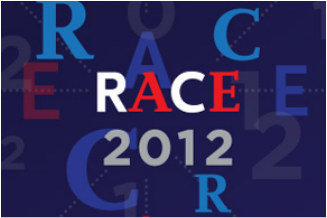 Race 2012 Tags: demography/population, immigration/citizenship, politics/election/voting, race/ethnicity, bifurcated racial hierarchy, post-racial America, white privilege, subtitles/CC, 21 to 60 mins Year: 2012 Length: 56:16 Access: YouTube Summary: This PBS documentary uses a political frame to discuss race and politics in America, taking advantage of the political significance of the election of President Barack Obama to set the background for a discussion on the history and politics of race in the United States. Race 2012 uses a nice blend of known academic scholars in political science and sociology, authors, activists, and political figures to provide a narrative on race in America today. The film provides perspectives on questions such as: 1) How do we define a racist or racism? 2) What does a changing minority demographic and a decreasing white demographic mean for America? 3) How do political parties tailor their political platform around an implicit racial narrative? and 4) How are non-Black minorities racialized and positioned within a bifurcated white/black racial hierarchy? Other important themes include contrasting early 20th century discourses around government assistance, which were framed as “nation building” policies and largely benefited whites, with current discourses around government assistance (or “welfare”) which are framed as “handouts” and are believed to largely benefit minorities, despite many whites also receiving these entitlements. The relevance of race in the construction of both a Republican and Democratic party identity is discussed in light of the changing racial demographic in America and persistent explicit and implicit anti-minority sentiments. This documentary would be a nice addition to broad discussions of race in the classroom as it provides both a historical and contemporary perspective on race. It also illustrates the ways that seemingly “race neutral” policies get coded with racialized meanings, and how these racial codes benefit and stigmatize racial groups differently. The documentary can also be useful for more specific discussions on race, demographic shifts, and political narratives, and the implications of these shifting demographics on the future of U.S. electoral politics. Submitted By: Shanna Brewton-Tiayon, Doctoral Student, University of Maryland
1 Comment
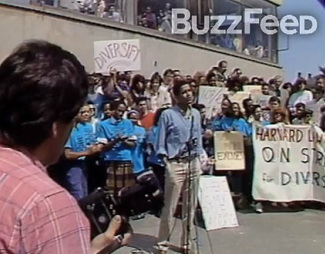 Barak Obama speaks at a rally to promote diversity Tags: discourse/language, knowledge, media, politics/election/voting, race/ethnicity, theory, derrick bell, critical race theory, fear, 11 to 20 mins Year: 2012 Length: 13:10 Access: YouTube Summary: In the Academy Award-winning documentary Bowling for Columbine, filmmaker Michael Moore highlights, among other things, the ways in which fear—and specifically white fear of black men—is manufactured through the American media (e.g., here). Moore places the history of American gun policy and gun violence within this context. This American tendency to invent fear using racial justifications is also a useful framework for contextualizing the "controversy" over the video footage released in March 2012 that depicted then-law student Barak Obama introducing law professor Derrick Bell at a rally to promote diversity among Harvard faculty (Professor Bell was the first tenured African-American Professor of Law at Harvard Law School). The conservative group Breitbart.com used the video as evidence of Obama's support of critical race theory (CRT), an intellectual project developed by Bell and others to illustrate the intersection of race, law, and power, and the ways in which American institutions are fundamentally organized by racialized power structures that disadvantage people of color. CRT is rooted in a tradition of social justice. While much buzz surrounded the story, this particular video clip is useful for highlighting how the racialized politics of fear gets used to shape American discourse and ideology (as well as discredit knowledge). Viewers can watch the invention of fear unfolding before their very eyes, bearing witness to the myriad of ways the more-or-less innocuous footage is described as a "bombshell," the likening of Bell to Rev. Jeremiah Wright (another black man who was successfully deemed radical and worthy of fear), and how Obama "forced" his students to read Bell at the University of Chicago. The racial politics of fear is explicitly evoked at the 6:27 minute mark. As the November elections draw near, viewers can be encouraged to look out for similar projects around the invention of fear unfold, particularly around Obama's race. Submitted By: Valerie Chepp 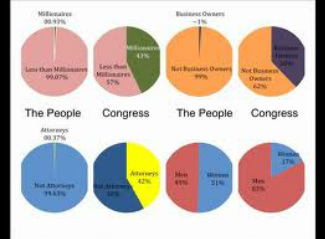 Tags: government/the state, politics/election/voting, democracy, legislation, proportional representation, sortition, 06 to 10 mins Year: 2012 Length: 7:11 Access: thecommonlot.com Summary: "Our Common Lot: Next Step for Democracy" is a plea for a government by the people, all the people. Using the "20-20" discipline as presentational format (i.e., 20 panels, each strictly 20 seconds long), "Our Common Lot: Next Step for Democracy" explains why sortition (random selection) is---as Aristotle said of the first democracy---the defining hallmark of democracy, and why elections are the hallmark of oligarchy (rule by a few). This clip can be used to provoke classroom discussion about fairness and "people power." It could also be used as a jumping-off place for practicing sortitional selection in schools (e.g., What would this look like in the context of student government?). In the sociology classroom, the clip might be useful for discussing the institution of politics, and specifically various approaches to democratic institutions and state formations. Instructors might also use the video as a way to discuss race, ethnic, gender, class and other forms of representation in electoral politics; namely, if democratic institutions are supposed to be represented by people who "look like us," why is there such race, ethnic, gender, and class homogeneity in politics, as literature on the power elite suggests? Viewers can be encouraged to critically weigh the potential advantages and disadvantages of a government determined by sortition. See The Common Lot's website for additional information and resources. Submitted By: Common Lot Productions  Melissa Harris-Perry Melissa Harris-Perry Tags: abortion/reproduction, historical sociology, government/the state, politics/election/voting, theory, violence, weber, civil liberties, democracy, melissa harris-perry, social contract theory, states rights, thomas hobbes, 11 to 20 mins Year: 2012 Length: 20:55 Access: msnbc Summary: The social contract refers to the individual's acceptance of some social rules and limitations in exchange for the protections and benefits from the state. The concept was initially developed in the philosophies of Thomas Hobbes and Jean-Jacques Rousseau; however, sociologist Max Weber further specified the social contract as it relates to violence by highlighting how all forms of political organization including democracy, entrust "the state" (e.g. government at all levels) as the only social institution that can legitimately use physical force. In this video, political scientist and pundit Melissa Harris-Perry applies this Weberian approach by arguing that the State of Virginia failed to force women to undergo an invasive procedure, known as a transvaginal sonogram, prior to having an abortion because social consensus concluded it was not a legitimate use of force (or even violence) by the government. In other words, the state was in breach of the social contract. For a similar discussion on the same political issue, Rachel Maddow explores the fringe pro-life movement’s use of illegitimate violence against abortion doctors in her full-length documentary, The Assassination of Dr. Tiller. Submitted By: Jason Eastman 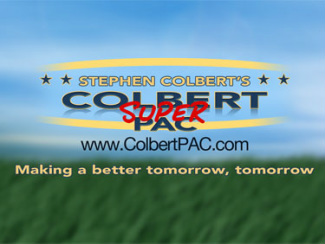 Tags: discourse/language, emotion/desire, politics/election/voting, social mvmts/social change/resistance, framing, political sociology, 00 to 05 mins Year: 2012 Length: 1:26 Access: colbertnation.com Summary: Frank Luntz is a Republican Party strategist, pollster, and frequent commentator on the Fox News Channel. According to Luntz, his specialty is “testing language and finding words that will help his clients sell their product or turn public opinion on an issue or a candidate.” Comedian Stephen Colbert, recently hired Luntz to help him frame the language of his Super PAC, which he formed as a way to satirize the Supreme Court's Citizens United decision. Through humorous exchanges with Luntz, Colbert reveals some of the linguistic and political aspects of framing and attempts to create or engage with memes. The clip provides a light way to introduce work on the importance of framing in social movements, but it could also be useful for political sociology classes. I successfully paired the clip with an overview of Snow and Benford's work on framing, mobilization, and collective identity. The clip is also useful as a precursor to discussing Francessca Polletta's brilliant book, It Was Like A Fever. Note that another clip on The Sociological Cinema that explores framing as it pertains to social movements can be found here. Submitted By: Kim Simmons  Tags: immigration/citizenship, nationalism, politics/election/voting, prejudice/discrimination, race/ethnicity, social mvmts/social change/resistance, assimilation, boundary work, imagined communities, nation, tea party, 21 to 60 mins Year: 2010 Length: 23:19 Access: YouTube Summary: This clip is a short news documentary from Al Jazeera's Fault Line and features Josh Rushing's reporting on Arizona's new immigration law, known as Senate Bill 1070 (SB 1070). The new law specifies that it is a misdemeanor crime for an alien to be in Arizona without carrying registration documents, leading critics to charge that the law effectively codifies racial profiling. Rushing interviews, Arizona State Senator, Russell Pearce, Tea Party protesters, undocumented residents, and members of local law enforcement for the piece. In addition to being informative about issues regarding immigration and citizenship, the clip might be useful for illustrating the continuing relevance of nationalism and how nationalist ideologies incite people to action. At about 6:18, Rushing notes how people feel "victimized, as if the immigrants are taking something from them." The clip also provocatively connects politics with the economy and suggests that illegal immigration is a convenient scapegoat handed to people who have been hit particularly hard by the recent recession. Submitted By: Lester Andrist 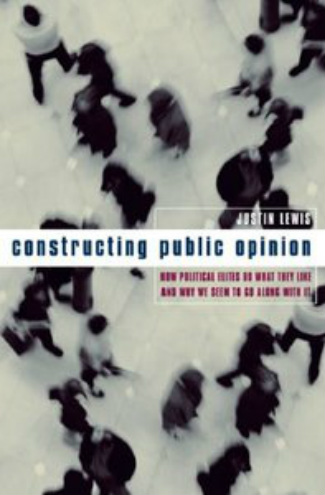 Tags: government/the state, media, politics/election/voting, chomsky, 00 to 05 mins Year: 2009 Length: 5:58 Access: YouTube Summary: In this clip, professor Justin Lewis discusses the role of the US media in "manufacturing consent." The media, Lewis explains, is not used as a device which necessarily tells people what to think, but rather, it tells them what to think about and is therefore an agenda setting device. Lewis further discusses the role the media plays in elections by giving the American public the illusion of a distinct choice between political candidates, when in fact differences between Democrats and Republicans across substantive economic issues are often very minor. I have successfully used this clip in an introductory sociology class as a means of sparking discussion about the power of the media. The clip works particularly well as a means of supplementing Noam Chomsky's book, Media Control: The Spectacular Achievements of Propaganda. Submitted By: Lester Andrist 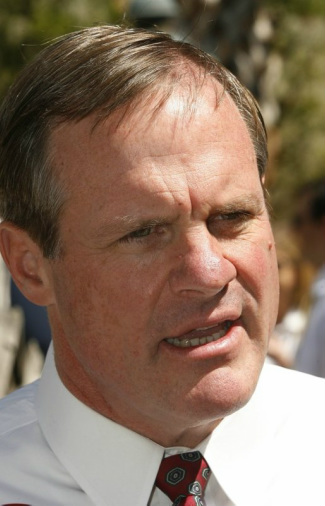 Tags: discourse/language, immigration/citizenship, nationalism, politics/election/voting, prejudice/discrimination, assimilation, boundary work, imagined communities, nation, 00 to 05 mins Year: 2010 Length: 0:33 Access: YouTube Summary: This clip is a campaign ad for Tim James, the republican candidate for Governor of Alabama. The candidate notes that currently Alabama offers drivers license tests in 12 languages, and as governor, he will push to have the test given only in English. Although the candidate suggests this proposal is spurred by good business sense, one could argue that the ad is a thinly veiled attack on recent immigrants to the United States. Note that the caption under the YouTube clip mentions that the issue is important for "Republican voters who are deeply concerned about..illegal aliens." The clip can be useful for demonstrating contemporary concerns about assimilation in the United States. It may also be useful for instructors who are drawing from Anderson's Imagined Communities and want to communicate the different styles by which communities are imagined. The United States has often been imagined as an immigrant nation, but here one sees a move to imagine people who don't speak English as their first language as outsiders. Submitted By: Lester Andrist  Tags: emotion/desire, gender, media, politics/election/voting, hillary clinton, john edwards, 00 to 05 mins Year: 2008 Length: 0:47 Access: YouTube Summary: In this clip, we see John Edwards respond to accusations that he criticized Hillary Clinton for getting emotional during the 2008 Presidential Primary (view a clip of Clinton). What's interesting is when the interviewer asks Edwards whether he's ever "teared up" on the campaign trail. Edwards staunchly claims to never have cried on the campaign trail, despite acknowledging the grueling, tough nature of the work. In making this claim, Edwards not only reinforces an ideal of hegemonic masculinity (i.e., the stoic man), but also uses this appeal to hegemonic masculinity as an indication of his ability to "handle" the tough world of politics, thereby distancing himself from anything feminine and making an implicit claim about the incompatibility of femininity (i.e., women and specifically Clinton) and politics. Submitted By: Valerie Chepp |
Tags
All
.
Got any videos?
Are you finding useful videos for your classes? Do you have good videos you use in your own classes? Please consider submitting your videos here and helping us build our database!
|
 RSS Feed
RSS Feed
